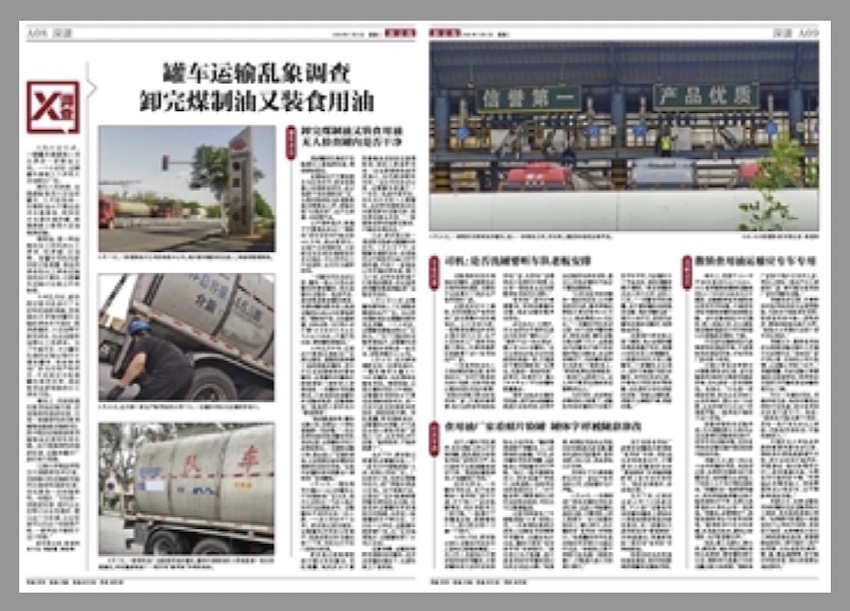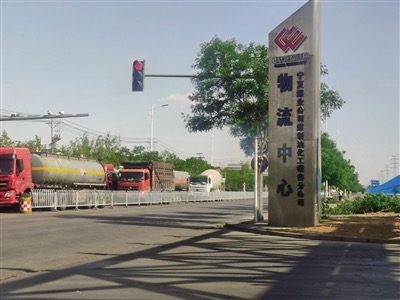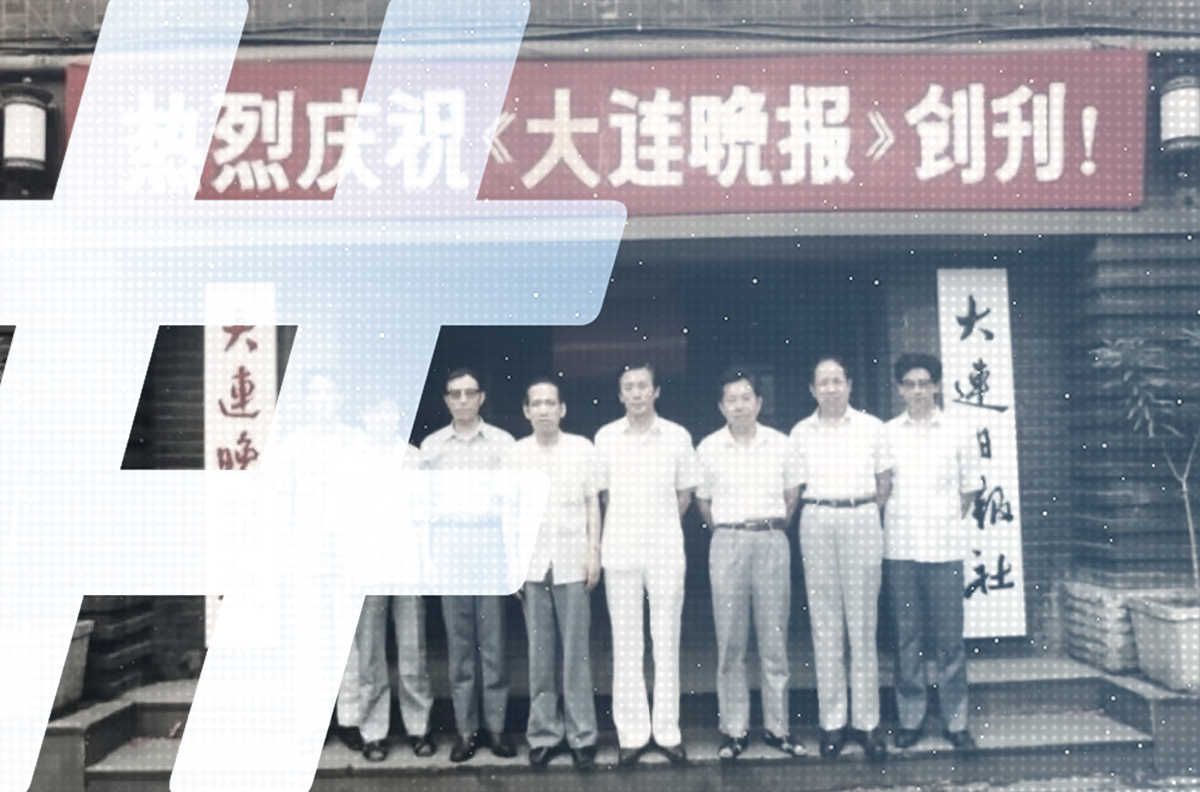
On July 2, the Beijing News kicked up nationwide health concerns in China by reporting that the state-run grain stockpiler Sinograin was using the same tanker trucks to transport both fuel and food oil products, forgoing any cleaning process between. Naturally, Chinese consumers were infuriated at the idea that their soybean oils and syrups might be sloshed together with coal-to-oil (CTL) products, which use coal as a raw material to produce oil and petrochemical products through chemical processing.
In a more active press system, Sinograin’s violations might have been revealed long ago. According to the report, the safety violations of the Sinograin oil truck fleet have long been an “open secret” in the industry — and it lays bare the fecklessness and ambiguity of national standards, which are treated as recommendations only, and routinely ignored by oil manufacturers and transporters.
The Beijing News report, which was promoted on the front page and ran to over 5,000 words on the inside pages, closely documented the transport process of both chemical and food oils. Reporters, for example, trailed one tanker truck that loaded up with first-grade edible cooking oil in the city of Sanhe, in Hebei province, just three days after it had unloaded a cargo of coal-derived chemical oil at a port to the east — without any washing or sanitizing of the tank in between.
Investigative reports of this kind, many focusing on basic livelihood concerns such as food safety, were a common occurrence in China from the early 2000s through to around 2008, when Shanghai’s Oriental Morning Post newspaper revealed that infant formula produced by China’s Sanlu Group was tainted with the chemical melamine, resulting in kidney damage and other serious health issues for infants. In the years that followed, Chinese authorities leaned more heavily on professional media in China, and investigative reporting became rarer and rarer.
Enterprising reports like that last week in the Beijing News, a state-run newspaper under Beijing municipal propaganda office that into the early 2010s was among the country’s more outspoken professional outlets, have become a true rarity in the Xi Jinping era, as the leadership has emphasized “positive propaganda” and the need for media to abide by “correct public opinion guidance.”
It goes without saying that such reports should be celebrated when they do appear. Below, we provide a partial translation.
_______________
An Investigation of Tanker Truck Transport Chaos in Unloading Coal Oil and Loading Edible Oil (罐车运输乱象调查卸完煤制油又装食用油)
Han Futao (韩福涛)
At 10 AM on May 21, an oil tanker truck slowly pulls in to an oil company in Yanjiao, [a town in central] Hebei province. One hour later, this tanker truck leaves the facility loaded with more than 30 tons of soybean oil.
What casual observers may not know is that just three days ago this tanker full of edible soybean oil transported a truckload of coal-to-oil from Ningxia to Qinhuangdao, [on Hebei’s coast]. After unloading, it was directly loaded with edible soybean oil for transportation, with no cleaning of the storage tank.

Like white oil moisturizer and liquid wax, coal-to-oil is a chemical liquid processed from coal. A tanker driver revealed to a reporter for the Beijing News that it is an open secret in the tanker transportation industry that food liquids and chemical liquids are mixed [during transport] without cleaning.
From May this year, reporters for the Beijing News carried out an extensive follow-up investigation and found that the liquids transported by many general cargo tankers in China are not allotted fixed substances, but carry edible liquids such as syrup and soybean oil as well as chemical liquids such as coal-to-oil. In order to save expenses, many tankers do not clean the tank during the exchange and transportation process, and some cooking oil manufacturers do not strictly check whether the tank is clean according to regulations. As a result, edible oil is contaminated by residual chemical liquids.
In fact, there is no mandatory national standard at present for the transportation of edible oil in China. There is only a recommended Code for Bulk Transport of Edible Vegetable Oil, which mentions that special vehicles should be used for the transportation of edible vegetable oil in bulk. Because it is a recommended national standard, this means that it has limited binding force on manufacturers.
Professor Wang Xingguo (王兴国) of the School of Food Science and Technology told our reporters that although the current transportation norms are recommended national standards, they are also to a certain extent mandatory. “These are national standards,” he pointed out. “When formulating company standards, companies should rely on them. Generally, company standards need to be stricter than these standards, and certainly cannot be lower.”
Mixed Tanker Transport
Once coal-to-oil is unloaded and before edible oils are loaded, no one checks to make sure the tank is clean.
Many tankers are piled up in the parking lot of the Ningdong Energy and Chemical Engineering Base, all waiting to load up and begin transport.
The base is located in the city of Lingwu, in China’s Ningxia Hui Autonomous Region. It has the largest coal-to-oil project in China. In the coal-oil factory area covering an area of thousands of mu, it is possible to “transform black coal into oil" and produce liquid wax, white oil and other downstream products through a series of complex processes involving high temperatures and high pressure.
Public information shows that this "coal-to-oil" project belonging to Ningxia Coal Industry (宁夏煤业) has an annual production capacity of 4 million tons, ranking it first in the country. Most of the coal-to-oil output here is shipped to economically developed regions on the east coast, where it can be used as raw material for chemical products, or as fuel.

A tanker driver told our reporter that tankers [at the facility] are generally divided into dangerous goods tankers and general cargo tankers. Dangerous goods tankers transport products such as gasoline, diesel and other flammable and explosive liquids; as the term suggests, general cargo tankers transport more ordinary coal-to-oil products such as liquid wax and white oil that are not regarded as dangerous — meaning that they cannot be ignited by an open flame (white oil burns with the use of a special gas cooker). Those products not regarded as dangerous can be transported by ordinary transport tanker trucks.
In mid-May this year, at the Coal Oil Plant operated by Ningxia Coal, the reporter observed that both sides of the road were jammed with transport vehicles of all kinds. Many of these were transport, tankers for coal oil and general cargo. Their outsides displayed information such as their volume and the “medium” (介质) [they transport]. One tanker truck driver explained that “medium” generally refers to the substances that tanker trucks transport, and coal oil is regarded as a “common liquid.“
“Right now is the low season, and there are fewer trucks than usual,” said a driver resting in the parking lot. “During the peak season, the lot can accommodate well over a hundred trucks.“ The driver told reporters that most of these tankers are usually parked close by in the area, and once they receive a transport order, they enter the plant to queue up and load up with oil. After that, the coal oil is transported to its destination according to the buyer’s needs. “Many tankers rely on the coal oil plants year-round to make a living,“ he said.
On May 16, a tanker truck with the license plate number “Hebei E××65Z” departed from the Ningdong Energy and Chemical Industry Base [in Ningxia]. It arrived two days later in Qinhuangdao, Hebei, more than 1,000 kilometers away. The tanker truck drove into a small courtyard on the outskirts of town, and set out again just over an hour later. The tanker did not leave immediately, but stopped on a nearby roadside. The driver opened the door as he rested inside the cab of the vehicle, the journalist from the Beijing News observed.
Pretending to ask about how business was going, the reporter from the Beijing News spoke to the driver, who revealed that he had just transported a load of coal oil from Ningxia to Qinhuangdao and unloaded it in a small yard. “They use the oil her to burn and use as kitchen fuel,” he said. He told the reporter that his tanker is one in a fleet of trucks, and that he is a full-time driver. There are more than 10 such trucks in the fleet. After unloading of coal oil, he said, he had not yet received new transport orders, so he was parking on the side of the road to rest. “Generally, we need to get [new] dispatch orders close to where we unload, and we can’t head back with empty vehicles,” he said.
After this [conversation], the Beijing News reporter remained close to observe the movement of the tanker. On the afternoon of May 20, the tanker restarted, and that evening it drove to the town of Yanjiao, just outside the city of Sanhe, in western Hebei province. There it drove into a parking lot belonging to a grain and oil company. According to guards at the facility, the parking lot belongs to Sanhe Huifu Grain and Oil Group, (汇福粮油集团). The tanker truck parked outside the facility and prepared for the transport of edible cooking oil.
At around 10 AM on May 21, the tanker drove right into the production area of the Sanhe Huifu Grain and Oil Group. The tanker had not been cleaned since unloading its cargo of coal oil [from Ningxia on May 18]. One hour later, the tanker was loaded with product the plant. According to the transport document maintained by the factory gatekeeper, the product loaded into the tanker at the factory was first-grade soybean oil, and the net weight of the load was 31.86 tons.




















